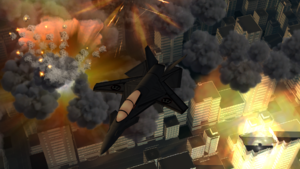Operation Tetraethyllead
|
Operation Tetraethyllead
Sahren civil war
|
|||||
|---|---|---|---|---|---|
| File:Tetraethalead1.png | |||||
| Location | North Sahrland | ||||
| Result | Republican victory | ||||
| Territorial Changes | Klensagrad commune annexed by Republicans | ||||
| Belligerents | |||||
| Republicans Phoenian volunteers |
Klensagrad Commune | ||||
| Republican Guard Republican Militia |
Klensagradite People's liberation front Partisans |
||||
| Strength | |||||
| 6th divizi ot Republina garda 2nd divizi ot Republina garda 23rd divizi ot Republina Dragoons Garda 1st divizi ot Republina Militziya 3rd divizi ot Republina Militziya 7th divizi Republina Militziya 24th divizi ot Republina Dragoons Militziya 25th divizi ot Republina Dragoons Militziya 16th divizi ot Republina Dragoons Militziya 18th divizi 19th divizi |
1st divizi KNST 2nd divizi KNST 5th divizi KNST 6th divizi KNST 7th divizi KNST 9th divizi KNST 10th divizi KNST 11th divizi KNST 12th divizi KNST |
||||
| Casualties and Losses | |||||
| (something) | (something) | ||||
Operation Tetraethyllead was an offensive undertaken by the Republicans during the Sahren Civil war in 2246. The goal of the operation was to take the city of Klensagrad from the Klensagrad commune as it was a major point of industry, recruitment, and morale. The city of Klensagrad was subjected to fierce house to house fighting and artillery during the coarse of the battle.
Background
The Klensagrad commune split away from the Labour party in late 2145 and the peninsula fell into stalemate. Zokesian battleships bombarded the city afterward. The republicans intended to win on the Bastian front first.
Opposing forces
Republicans
Prior to the operation's launchdate the Republicans allocated 11 divisions to field group black (feldgrupa Dyb in Egercian) including the volunteer divisions. These totalled to ~82,000 soldiers of which ~24,000 were Republican Guards. Overall command of feldgrupa dyb was given to general Daria Adaman. Additionally the Republicans had a total of 106 aircraft, 80 tanks, and 360 field guns.
Klensagrad commune
The Klensagrad Commune was fortifying the region for many months before the operation began. The Klensagradite people's liberation front officially had 9 divisions but only had ~52,000 soldiers. A majority of these were highly experienced from previous fighting. In overall command of the defence of the Klensagrad peninsula was general Duaren Yague.
Course of operation
Invasion of the peninsula
The operation began on (month) 2146. The first and second trench lines were overwhelmed within the first day of the operation but were stopped by heavy casualties. Republican aircraft bombed roads and railways to slow the Klensagradite retreat. As the Republicans advanced into the suburbs they had to begin clearing homes one by one against Klensagradite partisans. ~6,500 Republicans perished and 40 aircraft were destroyed before even entering the city. By contrast only 3,800 Klensagradites died before falling back to Klensagrad
Initial assault of Klensagrad
The Klensagradite people's liberation front (Klensagradina Narodina svobodad taob in egercian) were well fortified in the city leading up to the invasion. Everyone between the ages of 15-50 were called upon to fight as partisans. Republicans were unwilling to launch aerial attacks to minimize damage of the city. The battle quickly bogged down as a majority of the buildings closer to the centre were converted into bunkers. The Republicans were experienced in modern trench warfare and struggled against the guerilla campaign they were now against.
| “ | Five years happened in eleven days here. Nobody can ever describe what happened at Klensagrad because nobody can remember all of this. Only the deaf slept, and only the luckiest were not in a collapsing building or buried by one at least once. | ” |
| —"Klensagrad at war" | ||
By (date) the Republican Guard air-corp was completely stripped of restrictions and began a terror bombing campaign. Republicans seized the entirety of the (name) suburbs and were entering the southern district. By (date) the republicans authorized the use of tear gas in the sewers to stop the Klensagradites moving in them. At least 350 refugees were killed by fires caused by accidental ignition of the gas and another 1200 were suspected to have suffered related injuries.
The western district did not fall until (date) as it was the densest and most fortified. Offensive actions in this area took many casualties and further advanced were halted by (date).
Clearing of Goeth an tuascirt university
General Duaren Yague set his headquarters up in Goeth an tuascirt university in the eastern district of the city. Surrounding buildings were converted into pillboxes. Republicans began clearing the surrounding buildings in (date) and by (date) advanced onto the main complex. Casualties and damages were heavy on both sides. By (date) the Republicans were in control of half of the complex. Counterattacks on the eastern district cut off the Republicans from the rest of the city by (date) but after two days of relentless bombardment by aircraft and artillery the Klensagradites retreated from the encirclement. There are many theories about Duaren Yague's death but the most widely accepted one is that he was killed when the ceiling collapsed due to an artillery shell.
Final resistance
The battle continued after the death of General Duaren Yague. The last bastion of resistance was the Klensagradina Stahlduga where refugees were attempting to escape the Republicans via the sea. The vast majority of these were forcefully turned back by Phoenian naval patrols and held in hastily constructed camps. On (date) The incomplete Klensagradite destroyer "Midzha" was intentionally sank in shallow water to act as an artillery platform. A makeshift bridge was attached to a rock near the ship under heavy shellfire and it was stormed by 14 Republican guardsmen. The Republican guards were misidentified as Klensagradite partisans running a supply run and targetted by republican aircraft. Two timed fuze guided bombs landed in the sand near the Midzha and the blast rolled it over. The ensueing mass flood left only 3 of the Republican Guardsmen surviving and a singular Klensagradite surviving.
Aftermath
Casualties
Causalties
